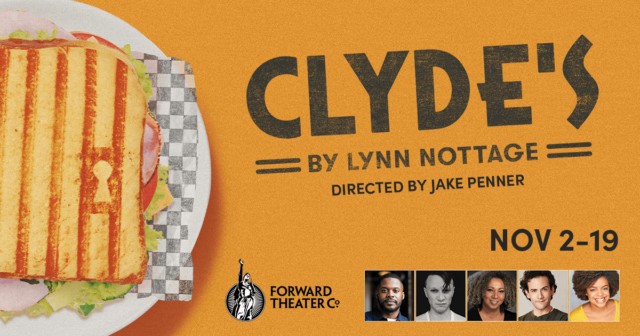Special promotional content provided by Forward Theater Company
By Mike Fischer
People ask me: Why do you write about food, and eating and drinking? Why don’t you write about the struggle for power and security, and about love, the way others do? . . . It seems to me that our three basic needs, for food and security and love, are so mixed and mingled and entwined that we cannot straightly think of one with the others. So it happens that when I write of hunger, I am really writing about love and the hunger for it, and warmth and the love of it and the hunger for it . . . it is all one.
– M.F.K. Fisher, The Gastronomical Me (1943)
Human begins are the only animals that cook. Therefore cooking is one of the things that makes us human. What better way to focus on the human being and its complexity but to focus on one of the things that defines us as human?
– Playwright Richard Nelson, on characters preparing and eating meals in his plays (2016)
Clyde’s – the comedy by two-time Pulitzer winning playwright Lynn Nottage being presented by Forward Theater between November 2 and 19 – unfolds in the kitchen of a truck stop sandwich shop.
But don’t let this humble setting – or the ostensibly simple food that’s made there – fool you.
It’s not just that the sandwiches you’ll hear described – including a grilled confection featuring blue cheese, spinach, habaneros and candied apples as well as pulled pork with pickled onions and blueberry compote on a soft pretzel roll – are unlike any you’ve ever seen or tasted.
Or that Montrellous – one of the shop’s employees – is alternately described as the “John Coltrane of sandwich making,” a “sensei,” and a “Buddha” who sees a good sandwich as his “strength,” his “victory,” and his “freedom.”
For as Montrellous tells his co-workers – every one of them a formerly incarcerated person, whose back stories are alternately harrowing, heartbreaking, and inspiring – the sandwich isn’t just the “most democratic of all foods,” “a complete meal that you can hold between your fingers.”
As Montrellous points out, creating a sandwich is also an invitation to invention and collaboration which says a great deal about our relation to each other and the world.
Kind of like theater itself.
The Art of Food
Long before the emergence of what we now call dinner theater – or, in the restaurant world, celebrity chefs performing the art of cooking in open kitchens – food and theater enjoyed an intimate relationship, with each other as well as other art forms involving song and dance. Their fusion was expressed through banquets and masques, tournaments and pageants, mystery play cycles and festivals.
Food wasn’t an afterthought. It was integral to representing and expressing our hopes and dreams for the way we lived and the world we wanted to build.
Perhaps that’s why Nottage’s Sweat (2015) – a play which shares a character with Clyde’s – unfolds in a bar.
It’s certainly why Nottage’s Crumbs From the Table of Joy (1995) – a play in which some characters are so impoverished that they’re starving – imagines a sumptuous banquet, even as one character “ravenously bites into [a] sandwich, fighting to force down the half-chewed chunks of food” while a second “greedily stuffs” everything from crumbs to cabbage into her mouth.
The sandwiches dreamed into being in Clyde’s function much like the bountiful banquet in Crumbs; in each case, such dreams of plenty offer refuge from a broken and hungry world.
The employees in Clyde’s work for a satanic boss who harasses and beats them, belittling their dreams and continually reminding them that as convicted criminals they’re lucky to even have a job; it’s worth noting here that Wisconsin remains among the overwhelming majority of American jurisdictions allowing an employer to not only ask about convictions on a job application, but also frequently deny employment on the basis of such convictions.
Boss Clyde has no use for her employees’ artsy sandwiches; ham-and-cheese on white or tuna on rye is good enough for her. She’s about speed rather than process and quantity rather than quality.
“Our kitchens and other eating places more and more resemble filling stations,” Wendell Berry warns in What Are People For? (1990). Berry continues: “‘Life is not very interesting,’ we seem to have decided. ‘Let its satisfactions be minimal, perfunctory, and fast.’”
Slow Food
In what we eat as well as how we watch – at table and in the theater – we increasingly turn to instantly gratifying, easily digestible meals, consumed with minimal thought, effort, or attention; even as they fill us up, they paradoxically leave us empty and hungry (thank you, social media).
We’re degrading our experiences. We’re shortening our lives. We’re failing to take the time to truly see and share with each other.
Conversely, Clyde’s is a play which Nottage herself described in an interview last year as being about “community, healing, creativity, mindfulness and forgiveness” – while living in a country which she described in a 2018 interview as having “lost [its] narrative. We can’t project our future because we don’t know where we are going.”
Might Montrellous and his coworkers offer us a way forward?
Even as Clyde warns her employees that she’ll “make sure you go back to whatever hell you came from” if they “disappoint me by having aspirations,” those employees quietly persist in their collective quest to make the perfect sandwich, without regard to how long that takes or what it might cost.
“My characters are always questioning and challenging the world within which they live,” Nottage wrote in a 2004 introduction to a volume of her plays. “They are unsettled souls, striving to make sense of their surroundings, and ultimately refusing to surrender to expectations.”
Will the characters in Clyde’s be able to hang on and hold out, insisting that they deserve more than crumbs from the American dream? Clyde’s will make you hunger for their sandwiches. Wouldn’t it be wonderful if we could actually taste them, as we finally break bread together?
For more information regarding and tickets to Clyde’s, visit https://forwardtheater.com/show/clydes.



































